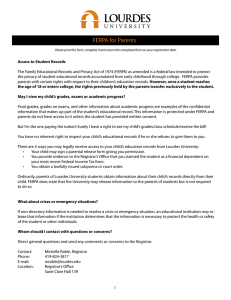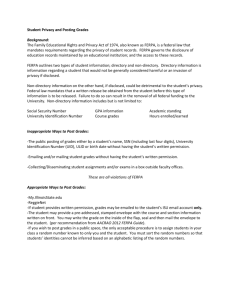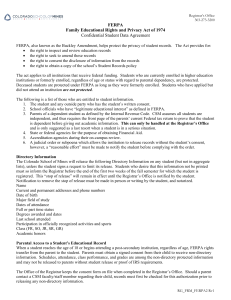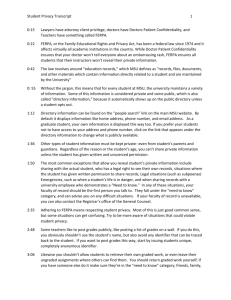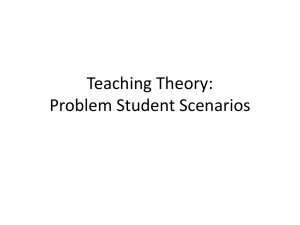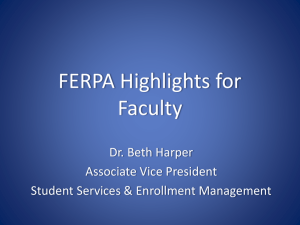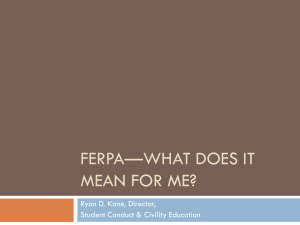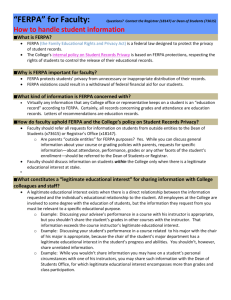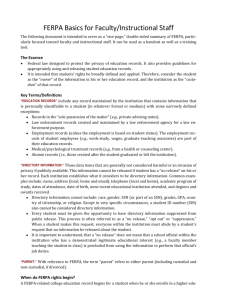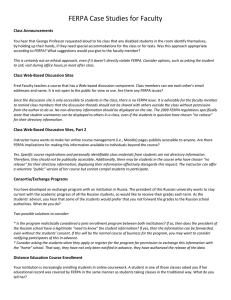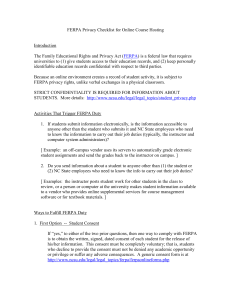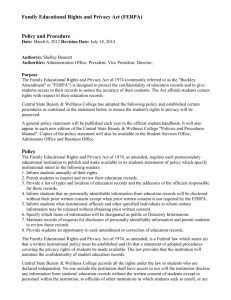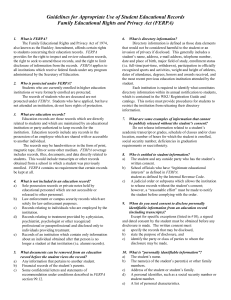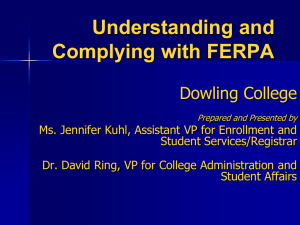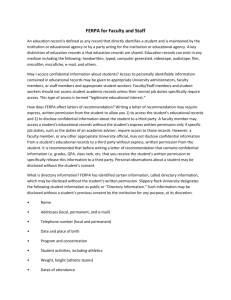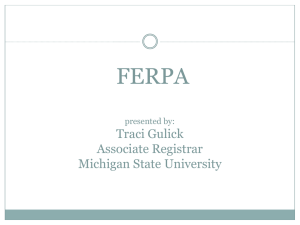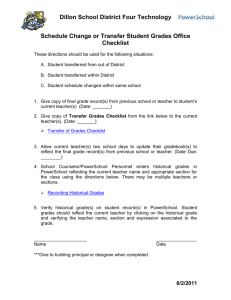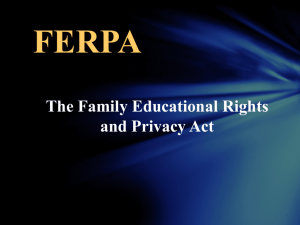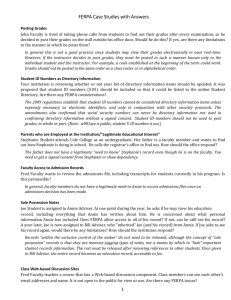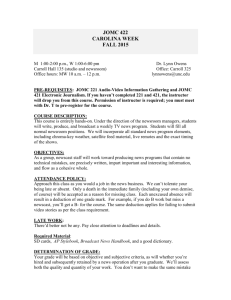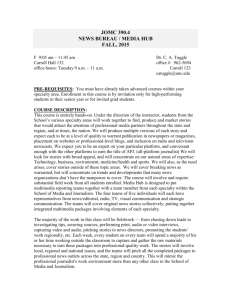FERPA DOs and DON`Ts - Ohio Northern University
advertisement
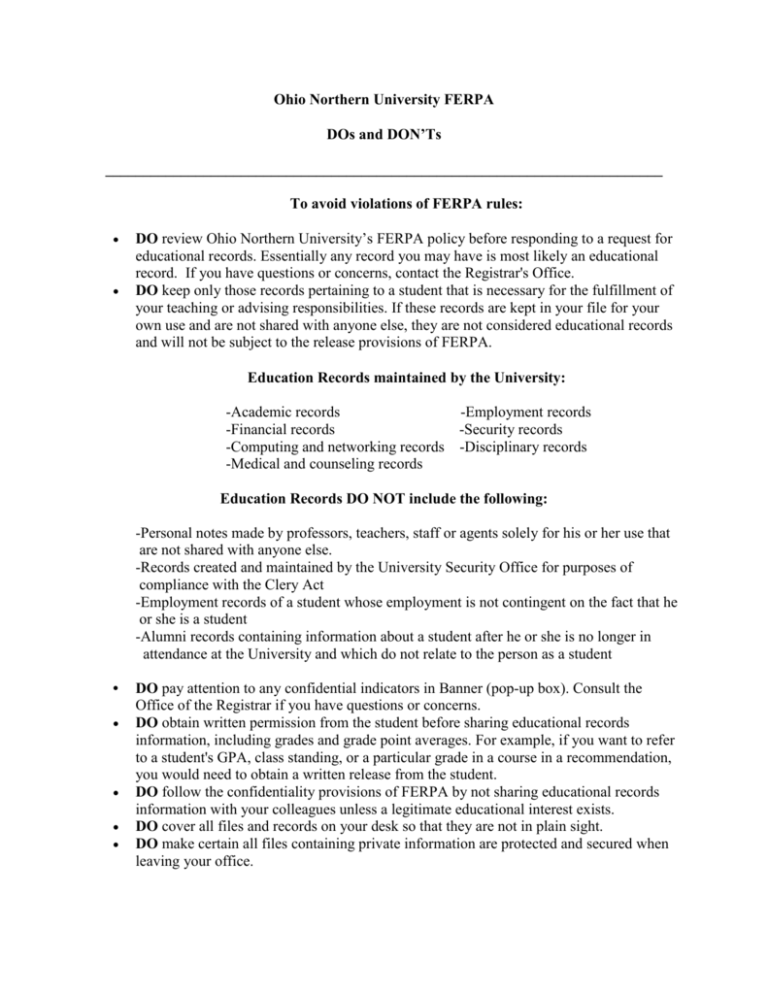
Ohio Northern University FERPA DOs and DON’Ts __________________________________________________________________________ To avoid violations of FERPA rules: DO review Ohio Northern University’s FERPA policy before responding to a request for educational records. Essentially any record you may have is most likely an educational record. If you have questions or concerns, contact the Registrar's Office. DO keep only those records pertaining to a student that is necessary for the fulfillment of your teaching or advising responsibilities. If these records are kept in your file for your own use and are not shared with anyone else, they are not considered educational records and will not be subject to the release provisions of FERPA. Education Records maintained by the University: -Academic records -Employment records -Financial records -Security records -Computing and networking records -Disciplinary records -Medical and counseling records Education Records DO NOT include the following: -Personal notes made by professors, teachers, staff or agents solely for his or her use that are not shared with anyone else. -Records created and maintained by the University Security Office for purposes of compliance with the Clery Act -Employment records of a student whose employment is not contingent on the fact that he or she is a student -Alumni records containing information about a student after he or she is no longer in attendance at the University and which do not relate to the person as a student • DO pay attention to any confidential indicators in Banner (pop-up box). Consult the Office of the Registrar if you have questions or concerns. DO obtain written permission from the student before sharing educational records information, including grades and grade point averages. For example, if you want to refer to a student's GPA, class standing, or a particular grade in a course in a recommendation, you would need to obtain a written release from the student. DO follow the confidentiality provisions of FERPA by not sharing educational records information with your colleagues unless a legitimate educational interest exists. DO cover all files and records on your desk so that they are not in plain sight. DO make certain all files containing private information are protected and secured when leaving your office. DO make certain that you have logged out of a student’s records before leaving your desk. DO lock up file cabinets and secure rooms that are used for storing confidential student files. DO make certain that fax machines, printers, copy machines, computer screens are not in a public environment or positioned as such so that third parties do not have access to student educational record information. Close files, cover papers, close office door, etc. whenever leaving a work station to ensure personally identifiable information is protected. DO refer all subpoenas or other legal process requests for educational records to the University’s legal counsel. DO err on the side of caution if you are unsure about a situation, and contact the Registrar's Office for guidance. To avoid violations of FERPA rules: DON’T share non-directory information from a student’s education records, such as grades or class schedules, with parents unless the student is present or if the student has voluntarily provided written permission for you to discuss the records with the parent. Refer parents to the Office of the Registrar. ONU Directory Information includes: -Student name -Home and local address and telephone -Major fields of study and college of enrollment -Degrees, honors, awards, and dates received -Class (year of study) -Dates of attendance -Most recent institution attended -Previous degrees earned and granting institutions -Participation in officially recognized activities and sports -Height and weight of members of athletic teams -Enrollment status (enrolled, withdrawn, full or part-time) -Name and address of parents(s) -Student e-mail address -Student picture DON'T put purely personal notes (ex. from a committee meeting recommending students for a particular program) in a student's file, as they will become accessible to the student. Such records can be kept confidential only if they are kept in the sole possession of the maker and are not accessible or revealed to any other person. Official committee minutes are likely to be considered accessible. DON’T ever link the name of a student, faculty, or staff member with that person's social security number in any public manner. DON'T display student scores or grades publicly in association with names, social security numbers (or any portion of a SSN) or other identifiers. If scores are posted, use a code known only to you and the student. DON'T leave grades, tests or assignments in a stack for students to pick up in a public place where a student's name can be associated with a grade. DON'T circulate a printed class list with students' names, social security numbers or grades as an attendance roster. DON’T leave out on your desk in plain sight student files or any print-outs that might have the student’s SSN or ID #. DON'T provide anyone with a list of students enrolled in your classes. Refer them to the Registrar's Office. DON'T provide anyone with student schedules or assist anyone other than university employees (working in the capacity of educational or safety interests) in finding a student on campus. DON'T release directory information on a student without checking to see whether the student has requested his/her information be blocked. DON'T just toss degree audits, transcripts, grades, etc. in the trash barrel. Any piece of paper with personally identifiable information on it needs to be destroyed properly. Shred it! DON’T ask for students’ social security numbers unless required by law. Student ID numbers should be used for internal use only and should never be released or posted publicly. DON’T provide non-directory information to third parties such as prospective employers, associations, honorary organizations, etc., without the student’s written consent. DON’T provide copies of their transcripts from other institutions to students. If you release copies of transcripts, you are acting as a third party testifying as to the accuracy of the information on the transcripts. DON’T access or request information from the student educational record without a legitimate educational interest and the appropriate authority to do so. DON’T provide notification of grades via email other than through Ohio Northern University’s e-mail addresses. There is minimal guarantee of confidentiality in email. The institution would be held responsible if an unauthorized third party gained access, in any manner, to a student’s educational record through any electronic transmission method. Students should, instead, be encouraged to access their portal to view their posted grades via a secure web site. DON’T give privacy protected information over the phone if identity cannot be determined. Although a signature is not required to release educational record information directly to the student, school officials must make certain that it is the student making the request. DON'T release information about a student's disciplinary matter without conferring with the Dean of Students. Immediate release of information is not required (FERPA allows up to 45 days). Ensure FERPA protection before release.
